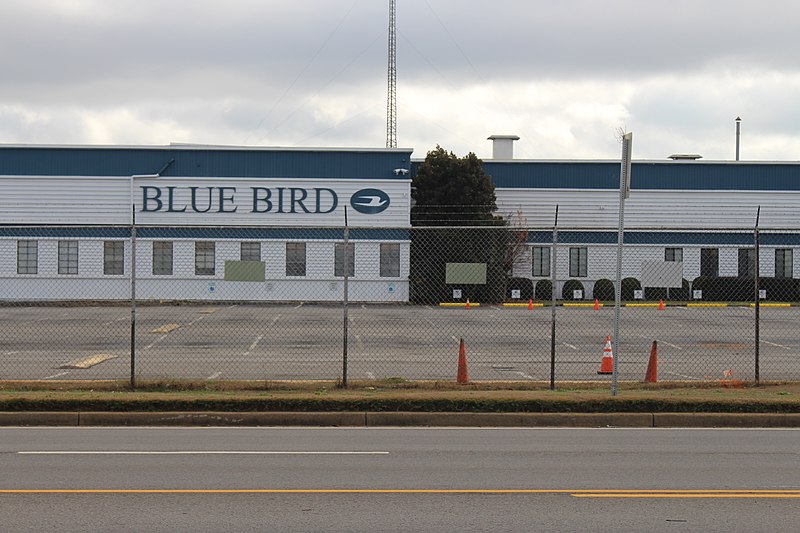
Will Ebeler is a student at Harvard Law School.
In this weekend’s news and commentary, workers at an electric school bus factory in Georgia vote to unionize; the New York City Council passes a bill banning height and weight discrimination; Goldman Sachs agrees to $215 million gender discrimination settlement; and a new study finds higher minimum wage leads to increased employment.
On Friday, workers at a factory in rural Georgia that builds electric school buses voted to join the United Steelworkers in a 697-to-435 vote. The factory in Fort Valley, Georgia is run by Blue Bird Corporation and will become one of the largest unionized workplaces in the South. An organizer with the Steelworkers said the workers at the factory usually earn starting wages of $16 to $17 per hour and that Blue Bird has long made it a practice to hire less-educated workers, some of whom have prison records.
Some observers hope this union victory is a sign that new federal policies can encourage organizing efforts at companies receiving federal funds. Blue Bird is a beneficiary of last year’s infrastructure bill, which included a rebate program to promote the use of low-emission school buses, and the Inflation Reduction Act, which authorized $5 billion over 5 years for clean school bus transportation. Those bills also included provisions that subtly encourage recipients to change their approach to unionization. For example, the EPA, which administers the school bus rebate program, will require any recipient company to report whether it has committed to labor neutrality or voluntary recognition and explain the benefits it offers to employees. And under last year’s infrastructure bill, federal money can’t be used to suppress a union election; the Steelworkers filed unfair labor practice charges against Blue Bird in April, alleging that the company had done just that.
But the experience of workers at Blue Bird suggests caution as to whether those measures will actually discourage union-busting. Cynthia Harden, who has worked at the factory for five years, described meetings where workers were shown slide shows that explained the voting process by showing ballots marked “no” and that said the company could go bankrupt if the union won. And she said there were suddenly food trucks at lunch and banners saying “We Love Our Employees!” on the factory’s perimeter fence.
On Friday, the New York City Council passed a bill that would ban discrimination based on height or weight. The bill would make height and weight a protected class in the city’s Human Rights Law, which bans discrimination in employment, housing, and places of public accommodation. It includes an exception for employers who consider height or weight when the decision is based in bona fide occupational qualifications. A few other cities ban weight discrimination, and Michigan is the only state to ban discrimination based specifically on weight, although the New Jersey and New York state legislatures are considering similar bills. The bill now goes to Mayor Eric Adams to sign; Mayor Adams told reporters in April he supported the bill’s intent but was reviewing the details.
On Monday, Goldman Sachs agreed to a $215 million settlement in a gender discrimination class action lawsuit. The plaintiffs had alleged that the company had systematically discriminated against thousands of female employees. They had argued that the company’s performance review process favored men and led to disparities in promotion opportunities and pay. The settlement will be divided among 2,800 class members for a total payout of $47,000 per member. The company also agreed to change its career advancement procedures and to hire independent experts who will study its performance review process and conduct pay-equity studies for the next three years.
Finally, economists and policymakers have been debating the employment effects of minimum wages for decades. A new paper by researchers at the UC Berkeley Institute for Research on Labor and Employment has found that high minimum wages increase overall employment. The paper, highlighted by New York magazine on Saturday, focused on the minimum wage in New York and California, two states where in a 7–8 year period the statewide minimum wage increased from $7.25 and $8, respectively, to $15. This was one of the first studies looking at the impacts of such a significant minimum wage increase. The researchers found that the minimum wage increases led to statistically significant reductions in income inequality and increases in overall employment. The authors explained the increase in employment using the monopsony theory, which argues that when there is a small number of employers in a labor market, the employers can set uncompetitive wages since there are few alternate employers for workers to go to. Monopsony theory predicts that moderate minimum wage increases in uncompetitive labor markets will increase overall employment. This study suggests that a $15 minimum wage will not cause negative employment effects.






Daily News & Commentary
Start your day with our roundup of the latest labor developments. See all
February 19
Union membership increases slightly; Washington farmworker bill fails to make it out of committee; and unions in Argentina are on strike protesting President Milei’s labor reform bill.
February 18
A ruling against forced labor in CO prisons; business coalition lacks standing to challenge captive audience ban; labor unions to participate in rent strike in MN
February 17
San Francisco teachers’ strike ends; EEOC releases new guidance on telework; NFL must litigate discrimination and retaliation claims.
February 16
BLS releases jobs data; ILO hosts conference on child labor.
February 15
The Office of Personnel Management directs federal agencies to terminate their collective bargaining agreements, and Indian farmworkers engage in a one-day strike to protest a trade deal with the United States.
February 13
Sex workers in Nevada fight to become the nation’s first to unionize; industry groups push NLRB to establish a more business-friendly test for independent contractor status; and UFCW launches an anti-AI price setting in grocery store campaign.